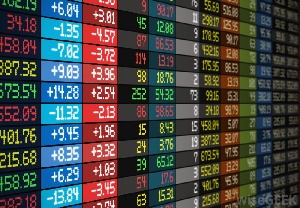Business News of Tuesday, 15 April 2025
Source: www.ghanawebbers.com
Share prices of dominant stocks rally GSE in Q1
According to GSE’s March 2025 Equities Market Report, 61.3 million shares were traded. This is a 75.87 percent decline from 254.2 million shares in the same quarter of 2024.
Despite lower trading activity, the value of trades rose to GH¢473.2 million. This represents a 29.28 percent increase year-on-year. Analysts attribute this shift to a focus on quality stocks with strong fundamentals.
Kofi Kyei Busia, a market analyst with Young Investors Network (YIN), explained the trend. He noted that higher share prices contribute more to overall value, even with lower volumes. As of March 2025, Gold ETFs led in value traded at about GH¢139 million, making up roughly 9 percent of total value.
MTN followed with GH¢46.9 million in trades, while Access Bank accounted for about 4.8 percent of total value traded. In terms of volume, MTN led with 14.8 million shares traded.
CAL Bank followed with 2.6 million shares and ETI had 2.3 million shares traded. Access Bank had around 600,000 shares but still ranked high by value due to its share price.
The GSE Financial Stock Index (GSE-FSI) gained 28.5 percent this quarter, slightly ahead of the GSE Composite Index (GSE-CI) which climbed by 27.19 percent.
Strong performance came from standout banks like CAL Bank and Ecobank Transnational Incorporated (ETI). Both recorded triple-digit share price increases due to improved earnings and positive guidance for 2025.
Access Bank and SIC Insurance also posted strong double-digit gains during this period. MTN Ghana remained a key driver of trade value despite lower volumes compared to previous quarters.
MTN's consistent dividend payouts and expansion into fintech have kept investor interest high. It led the market in volume traded and was second in terms of value during the quarter.
Energy stock TotalEnergies performed well too, gaining 83.54 percent in share price despite limited trading volumes.
In consumer goods, Fan Milk and Guinness Ghana saw renewed interest due to operational changes and export strategies. Their modest trading volumes did not prevent them from contributing significantly to overall market value because of their higher share prices.
In March alone, GSE recorded only 22 million shares traded—a drop of 89.48 percent from March 2024's figure of 208.7 million shares traded.
The monthly trade value stood at GH¢201.9 million, down by 35.59 percent year-on-year—continuing the trend seen throughout the quarter.
Average daily trading volume for Q1 dropped to just over one million shares compared to over four million in Q1 last year.
However, average daily trade value increased to GH¢7.89 million.
This suggests fewer trades are occurring but those that do are more valuable.
Market capitalisation reached GH¢136.99 billion at the end of March—up by 23.03 percent since January.
Domestic market capitalisation increased by nearly 27 percent driven by large-cap domestic stocks' gains.
Government policy on bonds has influenced this shift toward equities as well.
Liquidity that once went into government debt instruments is now moving into equities instead.
The government has taken an aggressive stance in Treasury auctions; some bids are rejected outright if they specify interest rates.
This situation has prompted many investors to seek alternative investment options like stocks.
One analyst stated that changes in the debt market have played a major role here.
Investors no longer expect favorable yields from Treasury markets; they are rebalancing into equities instead.
They prefer stocks with strong fundamentals and reliable dividends as safer investments now.
Market watchers believe that while lower trading volumes may raise liquidity concerns,
the rise in trade values indicates better capital allocation efficiency.
This reflects a maturing investment environment where fundamentals matter more than speculation alone.
Improved access to financial information supports this ongoing shift as well.
As both institutional and retail investors become more valuation-conscious,
fewer but more meaningful trades are shaping the market’s direction effectively now.











